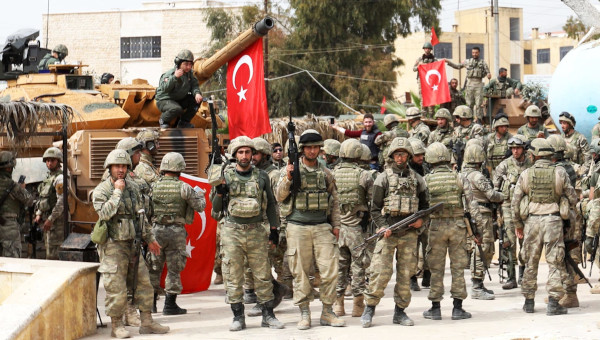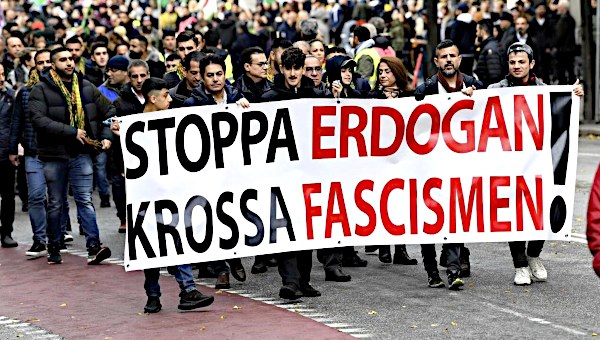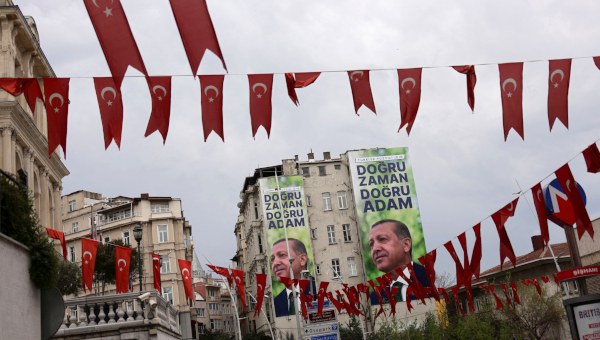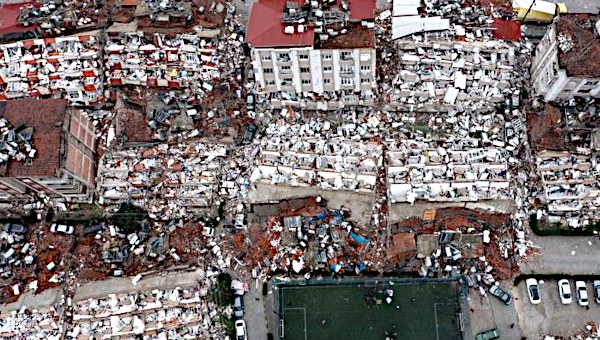End of the Road for the AKP?
In Istanbul, 2021 began with hundreds of students initiating a series of protests on the campus of Boǧaziçi University. They were demonstrating against President Recep Tayyip Erdoǧan’s January 1 appointment of a new rector via presidential decree. Melih Bulu, a business management Ph.D. and longtime Justice and Development Party (AKP) activist, was the first rector selected from outside the university since a military coup in 1980. Students chanted “Melih Bulu is not our rector” and “We don’t want a state-appointed rector.” (The song “Master of Puppets” could also be heard after Bulu gave an interview in which he claimed to be a regular guy who likes Metallica.)
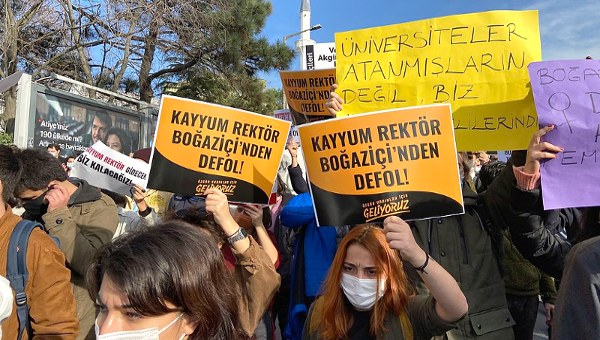
Police met demonstrators with pepper gas and plastic bullets; by early February 560 students had been detained, with 10 arrested and 25 sentenced to house arrest. Demonstrations have continued, however, importantly with broad faculty support. Students’ Boǧaziçi Solidarity platform demands Bulu’s resignation, and in early March seventy of the university’s professors applied to the Council of State to have the appointment rescinded. Erdoǧan and AKP officials labeled protesters terrorists, compared students to demonstrators involved in the 2013 Gezi uprising, and attacked LGBTQ student groups – since according to the AKP gay and trans people do not actually exist in Turkey. (Such deviant ideas are an import of the decadent West.)
The government’s response to the protests is of course no surprise. It was the brutal suppression of the Gezi rising of 2013 that revealed the true illiberal face of the AKP, and since a failed coup in 2016 the state’s repressive apparatus has stepped up efforts to eradicate opposition. Arrests and prison sentences for opposition politicians, activists, and journalists continue today, as Turkey’s human rights record continues to deteriorate.
But in recent weeks the Turkish state’s aggression has intensified. In addition to attempting to ban an International Women’s Day march on March 8, a new presidential decree withdrew Turkey from the Istanbul Convention, a Council of Europe initiative to combat violence against women and domestic violence. These moves coincided with the announcement of plans to close the left-wing People’s Democracy Party (HDP), the second-largest opposition party in parliament. While the state closure of political parties in Turkey is also not new, the prosecutor’s stated intention to ban 687 HDP politicians from politics marks a departure in its attempt to create a “Turkey without Kurds.”
While it may appear that the AKP (together with the far-right Nationalist Action Party (MHP), its junior partner in parliament) has taken the offensive, the recent aggressions are in fact an indication of the increasing desperation of the AKP-MHP “People’s Alliance.” For the last four years support for the Alliance has steadily deteriorated, with support especially low among young people. With no clear way out of a worsening economic crisis and in the face of growing popular opposition, the ruling bloc has abandoned even the pretense of adherence to basic democratic norms. While it would be unwise to underestimate the AKP-MHP’s ability to manufacture crises in the interest of maintaining power in the short-term, it is hard to see how it can reverse a long-term decline. But if the decades-long era of AKP dominance is coming to an end, what might replace it is anything but clear.
The Fall
The failure of an attempted coup in the summer 2016 briefly united all Turkish political parties in defense of democracy. The illusion of unity was quickly dispelled the following year, however, when a referendum replaced Turkey’s parliamentary system with an executive one. The plebiscite was held during a state of emergency in an atmosphere of blatant intimidation. “No” campaigners were harassed and arrested while AKP municipalities refused to allow events encouraging the referendum’s defeat. Nevertheless, the yes campaign won just over 51 per cent of the vote, despite clear evidence of fraud on election day.
The following year, 2018, saw the beginning of an economic crisis in which the value of the Turkish lira plunged as unemployment and inflation ballooned. In the midst of the recession Erdoǧan appointed his son-in-law, Berat Albayrak, minister of finance and treasury, which was immediately followed by a further drop in the lira’s value. Generally known simply as damat (son-in-law), and like his American avatar Jared Kushner, Albayrak has long been an object of ridicule in Turkey. It is difficult to say who is a more undeserving (and unsuccessful) beneficiary of nepotism, but in November of 2020 Albayrak was no longer in his post. With flagging growth, depleted currency reserves, and major dependence on borrowing from abroad, the lira lost another 30 per cent of its value in 2020.
The economic crisis largely determined municipal elections in 2019. Voters in Turkey’s two largest cities, Istanbul and Ankara, ousted the AKP and elected mayors from the Kemalist, and ostensibly social democratic, People’s Republican Party (CHP). Other major municipalities were also lost in a vote that constituted a major electoral setback for the AKP. Compounding the difficulties of deep recession and election losses was the defection of tens of thousands of party members, including founding AKP leaders who soon announced the formation of new parties. The party, never especially willing to criticize the Great Leader, is now nothing more than Erdoğan’s fiefdom.
It was in this context of economic crisis and growing political opposition that Turkey recorded its first official case of COVID-19 in March of 2020. Within a month, the Turkish Medical Association (TTB) accused the ministry of health of manipulating case numbers by excluding cases and deaths without a positive PCR test. Some estimated that true numbers were as much as ten times higher than those of the government. Yet by early May the first wave appeared to be receding, and at the beginning of June the government allowed the reopening of restaurants, parks, beaches, malls, and – crucially for the ailing economy – tourist facilities.
The government expressed a desire to limit daily cases to 1,000 at the beginning of the outbreak, and for a while official cases were remarkably close to that number. By August, however, hospitals and ICU units were full and it was soon undeniable that the government was seriously undercounting cases. On September 30, Health Minister Fahrettin Koca admitted that the government had previously excluded asymptomatic positive cases from its daily count, only announcing what it called “patients.” By the end of November, after being forced to release more accurate numbers, Turkey was recording the third-most daily cases in the world, following only the much larger US and India (Turkey’s population is 83 million).
After the imposition of lockdowns and weekend curfews, COVID numbers began to decline toward the end of the year (though by late March 2021 Turkey was again recording close to 30,000 daily cases). A delayed rollout of the Sinovac vaccine, trial disparities involving the vaccine’s efficacy, suspicions over fair distribution, and the government’s obfuscation of case numbers has left a large majority of people in Turkey lacking trust in the state’s ability to manage the pandemic. When combined with the daily revelations of AKP corruption from the municipal to the national level, it is hardly surprising only 32.5 per cent of voters have said they would support the AKP in elections. That young people who will be voting for the first time in parliamentary elections in 2023 are especially unsupportive of the AKP does not bode well for the party’s future.
The Reaction
The Boǧaziçi students’ chants against a “trustee” (kayyum) rector evoked the 1980 coup as well as the more recent state practice of removing democratically elected mayors and appointing pro-government replacements. Between 2016 and 2018, 94 of 99 municipalities run by the Peace and Democracy Party (the former sister party of the HDP in local governments) were removed by the central government and replaced by trustees. Ankara appointed dozens more trustees after the HDP swept Kurdish-majority towns and provinces in the 2019 municipal elections. While some in Turkey see the HDP’s closure as a gift from Erdoğan to the ethno-nationalist MHP, whose mafia-friendly leader Devlet Bahceli has demanded the party’s destruction, it is in fact the culmination of a years-long process.
Unfortunately for the People’s Alliance, presidential decrees and mayoral trustees in Kurdish-majority provinces cannot resolve the contradictions of capitalism. A New Economic Program announced by Bayrak before his departure was quickly criticized by mainstream and left economists alike. A new plan announced in March after a further deterioration of the Turkish lira offers little that is new; focus on “expenditure discipline” and labour “flexibility” are of course euphemisms for austerity and worker precarity. If improving life for the majority under neoliberalism is impossible, what is a capitalist party to do?
Making it impossible to know what is actually going on is one strategy. Erdoǧan and other AKP officials (Albayrak included) regularly sue journalists for “insulting” them; prosecuting reporters on vague charges of terrorism is also commonplace. Turkey ranked 154 out of 180 countries in Reporters Without Borders’ 2020 press freedom ranking, and in late 2019 the government began silencing opposition by banning public ads in independent newspapers. A new social media law requires large social networks to have a representative stationed in Turkey, and platforms will have to obey court orders to remove objectionable content.
Legal avenues to struggle have also been restricted. The 2017 referendum gave the president increased powers to appoint judges, and in 2020 the People’s Alliance in parliament sought to overturn a rule mandating one bar association per province. The move was an obvious attempt to break up the Union of Turkish Bar Associations (TBB), which has long constituted a powerful source of government criticism. Prior to the parliamentary vote (which passed in July), 78 out of 80 bar associations signed a statement opposing the change.
A particularly grotesque example of the use of law to deny justice to workers occurred in January 2021. In the spring of 2014, a coal mine explosion in western Turkey killed 301 miners and injured hundreds. Three Soma Coal Enterprises Inc. executives were sentenced to prison terms of 15 to 22 years for their role in the preventable disaster in 2019, and the following year the Court of Cassation declared the officials should be sentenced for causing death and injury by “probable intent.” In January of 2021, however, the Court overturned its own decision after three judges were replaced. Instead of “probable intent,” company officials caused deaths and injuries through “gross negligence.” In early February all the executives were released from jail.
Like progressive trade unions and the bar association, medical professionals’ national organization has been a vocal critic of AKP policies. As noted above, the TTB warned early on that the government was severely undercounting COVID cases, leading Erdoğan to charge the organization with terrorist affiliations and to demand “reforms” similar to that of the bar association. Erdoğan also claimed that the TTB “chose a terrorist as a leader” after it selected as its new chair Şebnem Korur Fincancı, who in 2016 signed an Academics for Peace petition that called on the government to end military operations in the Kurdish-majority southeast. As an important rejoinder to authorities, in late February Fincancı gave on online course to Boğaziçi students on “Academia and Human Rights in Turkey.”
The End?
With civil society organizations from the press to medical associations under constant attack, it isn’t surprising the Turkish state is also targeting higher education. Not only has Bulu refused to resign, in early February Erdoǧan issued another decree announcing the creation of law and communication faculties at Boğaziçi, in addition to appointing a host of new rectors and faculties at other universities.
The power to issue presidential decrees is a product of the 2017 referendum, which grants the executive the right to ministers, oversee of the budget, and choose judges. But if the constitutional changes were intended to consolidate AKP-MHP hegemony under Erdoǧan, the opposite has occurred. For example, public support for Boğaziçi students is overwhelming. A poll from late January showed 75 per cent of respondents support universities’ political independence, while 73 per cent believe teaching staff should select their own rectors. Only 17.9 per cent agreed with the current system – including less than half of AKP supporters.
The withdrawal from the Istanbul Convention and the closure of the HDP have also split conservative ranks. The pro-government Women and Democracy Association (KADEM) criticized the withdrawal, while former AKP leaders have opposed attacks against the HDP and its members. The People’s Alliance is attempting to rally its nationalist-conservative base around religion and the flag, while simply making it impossible for the opposition to function. Such an ideological strategy in a context of worsening material conditions is unlikely to succeed in the long run.
If its days are indeed numbered, what a post-AKP Turkey will look like is far from clear. If young people in Turkey trend liberal and left, at present there exists no organizational structure for the expression of these leanings. In the short-term, vocal support for the HDP is essential, as is the need to establish solidaristic links between social movements.
Ultimately, however, any left-of-centre government would confront the same economic problems as the People’s Alliance. Dependence on foreign loans and investment leaves developing economies like Turkey in a policy straight-jacket imposed by global capital. In addition to the formation of popular solidarities in the present, alternative visions for a just economic future are essential. If a post-AKP world can now be envisioned, the left must be prepared for what might come next. •


